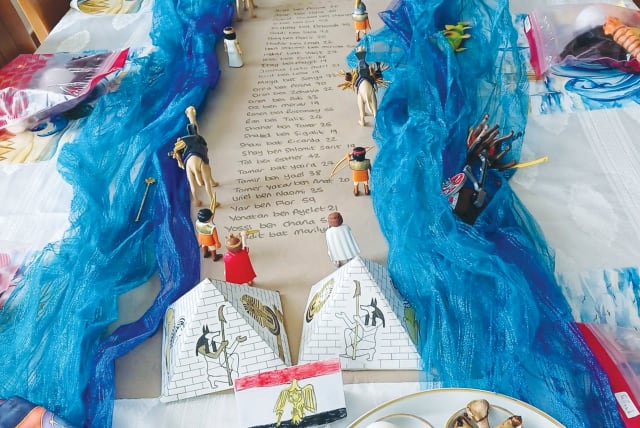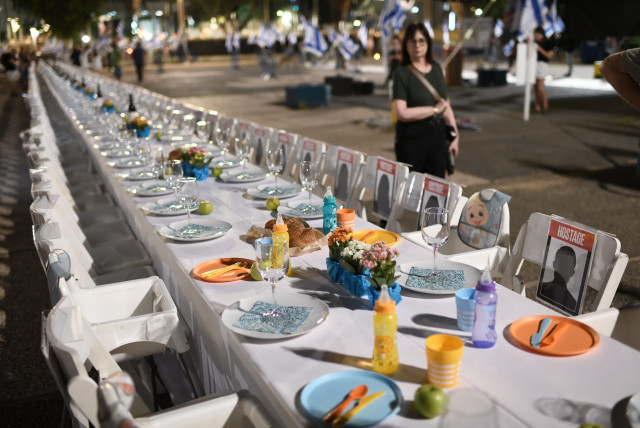Seder night gave us a chance to pause and remember those lost in the war - opinion

However we chose to mark or observe Seder night this year, the central theme for all but a few perhaps was the plight of the hostages and the victims of October 7.
As the war has taken its toll on us all in one way or another, just existing from day to day is enough of a challenge for many.
Processing the enormity of the tragedy that has befallen us as a country, a nation, and a people, as well as actively participating in the war effort is something that takes time, patience, and strength – attributes that are, understandably, in short supply in some quarters.
However, this doesn’t mean that, by getting on with our lives, we don’t care or think about the victims of October 7. While they are never far from our thoughts, many of us simply don’t have the head space or the energy to attend the weekly marches demanding the hostages’ release or drive across the length and breadth of the country delivering supplies to the soldiers.
The chance to pause and reflect
For this reason, Passover, and Seder night in particular, gave us all a much-needed opportunity to pause and reflect on what has happened. With freedom being the primary focus of Passover, our attention naturally turned to the victims of October 7 – and the hostages who remain in Gaza.
Up and down the country, and indeed across the Diaspora, Seder night took on a whole new dimension, with those still held in captivity playing center stage, even though, tragically, they had no idea about their integral role in proceedings.
Many jettisoned their regular Haggadot in favor of the Hostages and Missing Families Forum Haggadah, which was tailored to the plight of their loved ones.
An empty chair adorned with a yellow bow and a photograph of one of the captives, whose faces are now, sadly, so familiar, was set at most Seder tables.
New York-based Brit, Nicole Izsak, explained her choice of photograph: “I chose [Amiram Cooper], one of the 85-year-old hostages to represent them all. Never in a million years (or his 85) would he have thought that a total stranger across the world would be having a picture with his face and bio at a Seder, nor the reason why.”
And Cooper didn’t just “join” her family for their Seder: “It was very moving, ‘having him there,’ and he will stay all Passover as a reminder,” Izsak said.
London-born Israeli Bobby Lax incorporated the simple, yet heartfelt gesture of reading out the names of all 133 hostages during his Seder, while others, including the Lieberman family, inscribed their names down the center of the table.
US-based children’s author, Sandy Wasserman, went one step further, using the Seder as an opportunity to get to know more about the hostages themselves. On the first night, she explained, “We went around the table and read aloud all the names.” For the second Seder, each person chose “one hostage to [get to] know a little better [as] a meaningful way to ‘say their names’ and know them more as real people rather than just a statistic.”
AS A MARK of respect, many refrained from singing the songs at the end of the Seder, instead incorporating special prayers and readings, such as those penned by Chief Rabbi David Lau and Shelly Shem Tov, mother of hostage Omer Shem Tov, whose moving blessing was widely recited over a fifth cup of wine.
Some went to even greater lengths to empathize with the hostages. Leeds-based Alan Taylor, for example, sat in darkness throughout the evening: “We had our Seder in near darkness with four empty placings as if we, too, were in a tunnel with our greater family.”
Another, who took pains to remember the hostages at every stage of the Seder, was Paul Mirbach from northern Israel: “Everything we read was intertwined with our thoughts for them,” he explained.
“We added an extra matzah (the matzah of hope) and said a special prayer for their release and return.” Further, when reading about the four sons, “We changed the fourth son, from ‘he who did not know what to ask,’ to ‘the son who could not ask.’”
Regrettably, like many others, Mirbach’s Seder ended on a note of frustration at the government’s failure to secure the release of the hostages. “We ended with [a discussion that] what our government was doing to secure their freedom was not enough.”
Although, for many, enjoying the Seder was simply not possible, some managed to draw positives from the evening. As Judith Philips, who recently made aliyah and now lives in Netanya stated, “In spite of the fact it’s hard to feel gratitude at the moment and even harder to sing songs of praise, each of us had something to be thankful for.
It’s possible to feel deep sadness and gratitude in one’s heart at the same time; they aren’t exclusive.”
Fellow Jerusalem Post journalist, Atara Nurenberger Beck shared this sentiment. We “sang in celebration of the fact that we’re still here after surviving thousands of years of persecution – just like the Jews who participated in a Seder while experiencing abuse, pogroms, and even during the Holocaust.”
Sadly, some survivors have been so profoundly affected by the events of October 7 that they simply let Seder night pass without marking it in any way. Deborah Mintz, who, against all the odds, managed to survive the terrorist attack on her home on Kibbutz Nirim along with her family, is one such person.
“I did as planned,” she began. “Until they are free, I will not celebrate Passover. I will stay home alone and reflect on the days since 7/10. The day my world changed.”
However we chose to mark or observe Seder night this year, the central theme for all but a few perhaps was the plight of the hostages and the victims of October 7.
The evening gave us a chance to pause our busy lives, even just for a few hours, and focus solely on them.
Their now-familiar names and faces that have become emblazoned on our souls came to life on that evening.
We carry their pain and suffering around with us like a heavy burden that can’t be lifted until every single one returns home to their families, where they belong.
Until then, the yellow ribbons that adorn our clothes, wrists, and cars will serve as a constant reminder of their plight.
The writer is a former lawyer from the UK who now lives and works in Israel as a freelance writer for The Jerusalem Post.
Jerusalem Post Store
`; document.getElementById("linkPremium").innerHTML = cont; var divWithLink = document.getElementById("premium-link"); if (divWithLink !== null && divWithLink !== 'undefined') { divWithLink.style.border = "solid 1px #cb0f3e"; divWithLink.style.textAlign = "center"; divWithLink.style.marginBottom = "15px"; divWithLink.style.marginTop = "15px"; divWithLink.style.width = "100%"; divWithLink.style.backgroundColor = "#122952"; divWithLink.style.color = "#ffffff"; divWithLink.style.lineHeight = "1.5"; } } (function (v, i) { });

